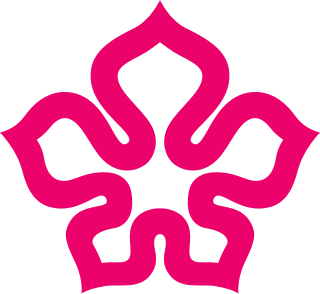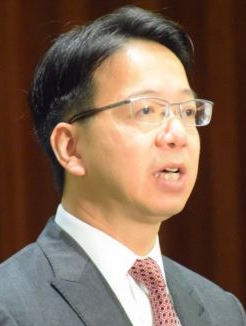
The Hong Kong local elections are elections in Hong Kong for the members of District Councils. First held in 1982, the elections are held at 4-year intervals for returning a total of 452 elected members as at 2019. The last election was held on 24 November 2019.

The Urban Council (UrbCo) was a municipal council in Hong Kong responsible for municipal services on Hong Kong Island and in Kowloon. These services were provided by the council's executive arm, the Urban Services Department. Later, the equivalent body for the New Territories was the Regional Council.

The Kowloon West geographical constituency was one of the five geographical constituencies of the Legislative Council of Hong Kong from 1998 to 2021. It was established in 1998 for the first SAR Legislative Council election and was abolished under the 2021 overhaul of the Hong Kong electoral system. In the 2016 Legislative Council election, it elected six members of the Legislative Council using the Hare quota of party-list proportional representation. It had 602,733 registered electorates in 2020. The constituency corresponded to the districts of Yau Tsim Mong, Sham Shui Po, and Kowloon City.

The 2007 Hong Kong District Council elections were held on 18 November 2007. Elections were held to all 18 districts of Hong Kong, returned 405 members from directly elected constituencies out of total 534 councils member. A total number of 886 candidates contesting in 364 seats, while 41 seats were uncontested. A total number of 1.4 million voters cast their ballots, consisting 38% of the electorate, significantly lower than the last elections in 2003.

The 1991 Hong Kong Urban Council and Regional Council elections were the municipal elections held on 5 May 1991 for the elected seats of the Urban Council and Regional Council respectively. The election saw the direct rivalry between the newly established political parties, the liberal United Democrats of Hong Kong (UDHK) and the conservative Liberal Democratic Federation of Hong Kong (LDFHK) which the liberal forces won a landslide victory.

The 1986 Hong Kong Urban Council and Regional Council elections were the municipal elections held on 6 March 1986 for the elected seats of the Urban Council for Hong Kong Island, Kowloon and New Kowloon and newly created Regional Council for the rest of the New Territories respectively.
The 1957 Hong Kong Urban Council election was held on 8 March 1957 for the four of the eight elected seats of the Urban Council of Hong Kong. Since this election the term of the members was extended from two years to four years.
The 1959 Hong Kong Urban Council election was held on 3 March 1959 for the four of the eight elected seats of the Urban Council of Hong Kong. The turnout rate dropped to 30.7 per cent but there were still 7,236 of the 23,584 eligible voters cast their votes, 5,354 ballots from Hong Kong Island and 1,882 from Kowloon. Ernest Charles Wong, chairman of the Tung Wah Group of Hospitals won a seat for the Hong Kong Civic Association of which Philip Au of the Reform Club of Hong Kong retired from, while the other three Club incumbents were re-elected.

The 1963 Hong Kong Urban Council election was held on 7 March 1963 for the four of the eight elected seats of the Urban Council of Hong Kong. Elsie Elliott, educator and social activist was first elected to the council on the Reform Club ticket, while lawyer Cheung Wing-in became the new elected member for the Hong Kong Civic Association.

The 1965 Hong Kong Urban Council election was held on 3 March 1965 for the six of the ten elected seats of the Urban Council of Hong Kong after the membership of the elected members increased from eight to ten.

The 1967 Hong Kong Urban Council election was held on 7 June 1967 for the five of the ten elected seats of the Urban Council of Hong Kong. A record of 38.7 per cent turnout as 10,130 of the 26,202 eligible voters came out and cast their ballots, in the middle of the Leftists' disturbances.

The 1979 Hong Kong Urban Council election was held on 8 March 1979 for the six of the 12 elected seats of the Urban Council of Hong Kong. 12,426 voters cast their ballots in the election, nearly 40 per cent of the 31,481 registered electorate, making it the most participated election before the 1983 reform.

The 1981 Hong Kong Urban Council election was held on 5 March 1981 for the six of the 12 elected seats of the Urban Council of Hong Kong. Only about 6,195 of the 34,381 voters, cast their ballots in the election, accounting for 18 per cent turnout rate, breaking the record as the lowest turnout rate in history until the 1989 Urban & Regional Council elections.

The 1991 Hong Kong District Board elections were held on 3 March 1991. Elections were held in all 19 districts of Hong Kong for 274 members from directly elected constituencies, which counted for about two-thirds of the seats in the District Boards.

The 1973 Hong Kong Urban Council election was held on 7 March 1973 for the seven of the 12 elected seats of the Urban Council of Hong Kong. Two new elected seats were created in the election. 8,675 eligible voters cast their votes, the turnout rate was 27.64 per cent.

Dr. Denny Mong-hwa Huang OBE was a Hong Kong doctor and politician. He was elected member of the Urban Council of Hong Kong from 1967 to 1986 and Hong Kong member to the Chinese People's Political Consultative Conference from 1986 to 1998.

The 2018 Hong Kong Legislative Council by-election was held on 11 March 2018 for four of the six vacancies in the Legislative Council of Hong Kong (LegCo) - the Hong Kong Island, Kowloon West and New Territories East geographical constituencies and the Architectural, Surveying, Planning and Landscape functional constituency - resulting from the disqualification of six pro-democrat and localist Legislative Council members over the 2016 oath-taking controversy. The by-election for the two other seats was not held due to pending legal appeals by the two disqualified legislators.
The White Paper on District Administration in Hong Kong (《地方行政白皮書》)was a white paper published by the Hong Kong Government in January 1981 on introducing elected bodies to local administration in Hong Kong and widening the electoral franchise of the Urban Council.
Sham Shui Po was a constituency elected by electoral college for the Legislative Council of Hong Kong in 1985 and 1988, which elects one member of the Legislative Council using the multiple-round elimination system and preferential elimination system respectively. The constituency covers Sham Shui Po District in Kowloon.
1984 Macanese legislative election was held in Portuguese Macau on 15 August 1988, returning 17 members of the Legislative Assembly of Macau, with 6 directly elected by electorates, 6 indirectly elected by special interest groups and 5 appointed by the Governor.











